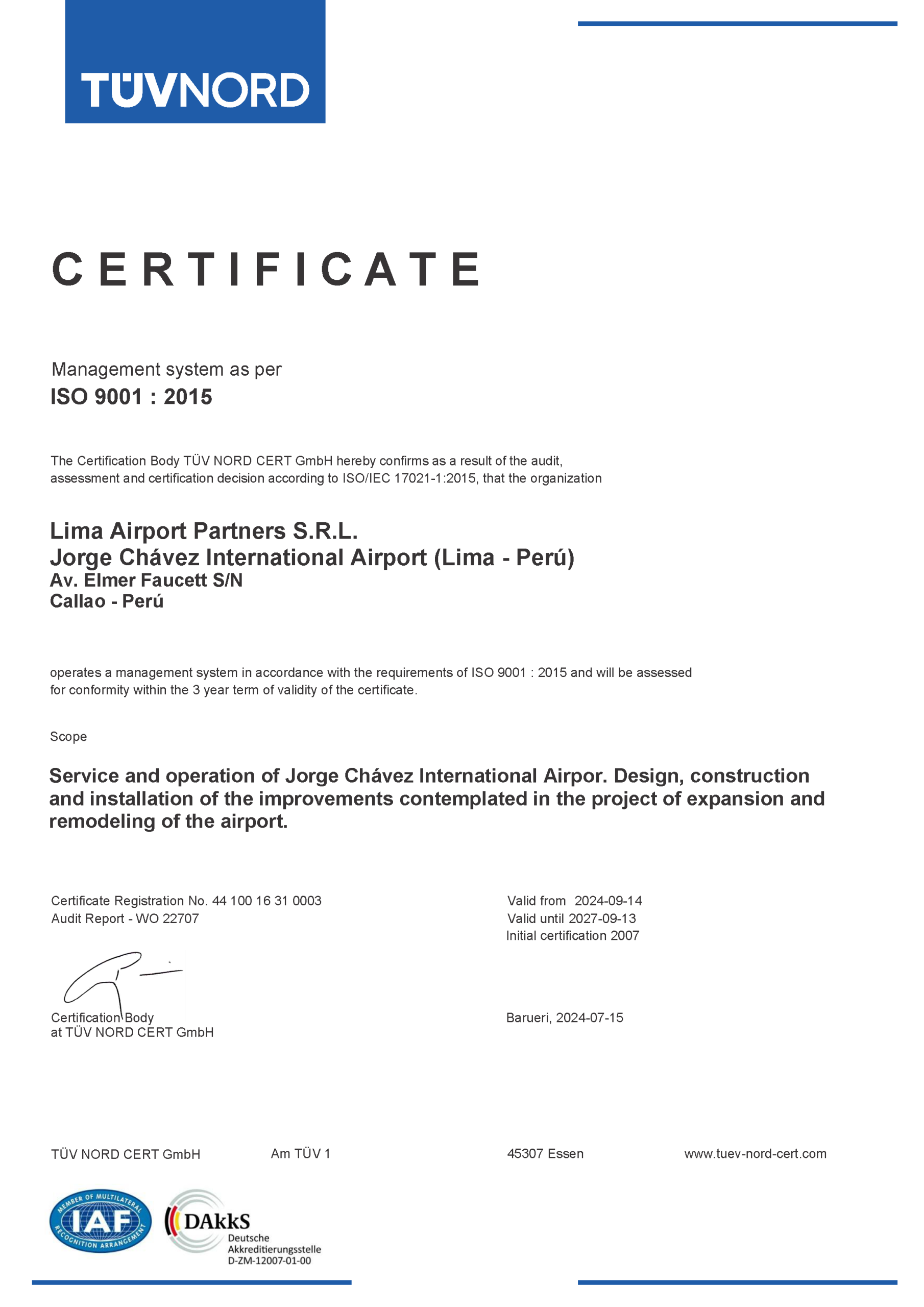The German company behind the expansion of Peru’s Jorge Chavez International Airport holds ISO 9001 certification for airport construction, despite the project being branded a “national joke” for monumental engineering failures, safety concerns, and endless delays.
Lima Airport Partners (LAP), a subsidiary established for the project by the German construction company Fraport AG, has been widely criticized for repeated problems with the project, many of which have left engineers and the public stunned at just how badly the project has been managed. The project was originally announced in 2018 with a price tag of $2 billion US and was officially inaugurated on June 1st of this year, despite major roads and at least one bridge never having been built to provide access to the airport.
The project was intended to add a second runway, increase annual traveler capacity from 12 million passengers to 60 million, build an entirely new terminal, as well as improve highway access to the airport.
Scandals, Delays and Safety Concerns
According to reporting by Bloomberg, a main highway “meant to whisk travelers to the $2 billion terminal has yet to be built,” and “a bridge to get across a river that runs along the grounds was never constructed.”
There’s a subway stop labeled “Airport” planned for Lima’s new metro system, but that station is set to be built (three years from now) much closer to the old airport that’s being decommissioned.
“Having a subway station named ‘Airport’ where there won’t be an airport anymore — it’s just the most graphic example of our lack of planning as a nation,” said Carlos Gutierrez, the head of Peru’s airline industry trade association.
In June of 2024, the airport runway lights went dark due to a short circuit, shutting down flights for a full day and forcing over 200 flights to be re-routed. After a new control tower was constructed, flight controllers found the windows were made of an type of glass that prevented them from seeing outside, forcing LAP to replace all the windows.
There is currently no bus service to the new terminal, which has caused chaos for both airport employees and construction workers who overwhelmingly travel by public bus. Temporary bridges — intended for emergency use in case of flooding — were installed to help cars cross the Rimac River.
LAP and the Peruvian government have fought between themselves, with each party blaming the other for the scandals.
 LAP, meanwhile, holds ISO 9001 certification from TUV NORD, and accredited by the German accreditation body DAkkS. The scope of that certificate is for “Service and operation of Jorge Chávez International Airport Design, construction and installation of the improvements contemplated in the project of expansion and remodeling of the airport.”
LAP, meanwhile, holds ISO 9001 certification from TUV NORD, and accredited by the German accreditation body DAkkS. The scope of that certificate is for “Service and operation of Jorge Chávez International Airport Design, construction and installation of the improvements contemplated in the project of expansion and remodeling of the airport.”
The certificate was originally issued by TUV NORD in 2007 for a related project and then reissued most recently in September 2024, after many of the scandals and problems had already emerged. The certificate remains valid as of this report.
Pay to Play
As reported by Oxebridge, ISO 9001 certifications are now issued to any company that can pay, without regard for the actual quality of the products or services produced. While this clearly contradicts claims on the certificates, such as those appearing in the scope of LAP’s certificate, certification bodies and accreditation bodies have refused to suspend or withdraw such certifications even in light of scandals, deadly disasters, and criminal fraud.
Fighting against whistleblowers and those pushing for reform of the scheme, the accreditation bodies, including DAkkS, have adopted policies that reject complaints and reports of fraud outright. The International Accreditation Forum (IAF), which is supposed to oversee the accreditation bodies, has supported the moves, allowing independent investigators and whistleblowers to be threatened, harassed, defamed, and even arrested.
Peru’s government had rejected calls to oust the certification body Bureau Veritas from the country, even after that body rewarded the company behind the Odebrecht bribery scandal with a director position. The “Operation Car Wash” scandal found Odebrecht guilty of bribing officials throughout Latin America, yet it was repeatedly awarded ISO certifications by Bureau Veritas. Former Peruvian president Alan Garcia committed suicide as police attempted to enter his house and arrest him for his role in the scandal. BV continues to operate in Peru.
DAkkS previously interceded to protect TUV NORD in a complaint filed against the certification body after it was discovered that its Saudi office was certifying the clients of its own consultants. The practice is prohibited, and DAkkS is tasked with enforcing the rules against such conflicts of interest, but instead, it sided with TUV NORD, shutting down the issue entirely. The Saudi office continues to certify its own consulting clients.
Oxebridge filed a separate complaint against TUIV NORD for operating in Russia, in violation of EU sanctions. That effort was successful, and TUV NORD shut down its Russia operations, even as questions arose why DAkkS had not been the body to take action in the case.







